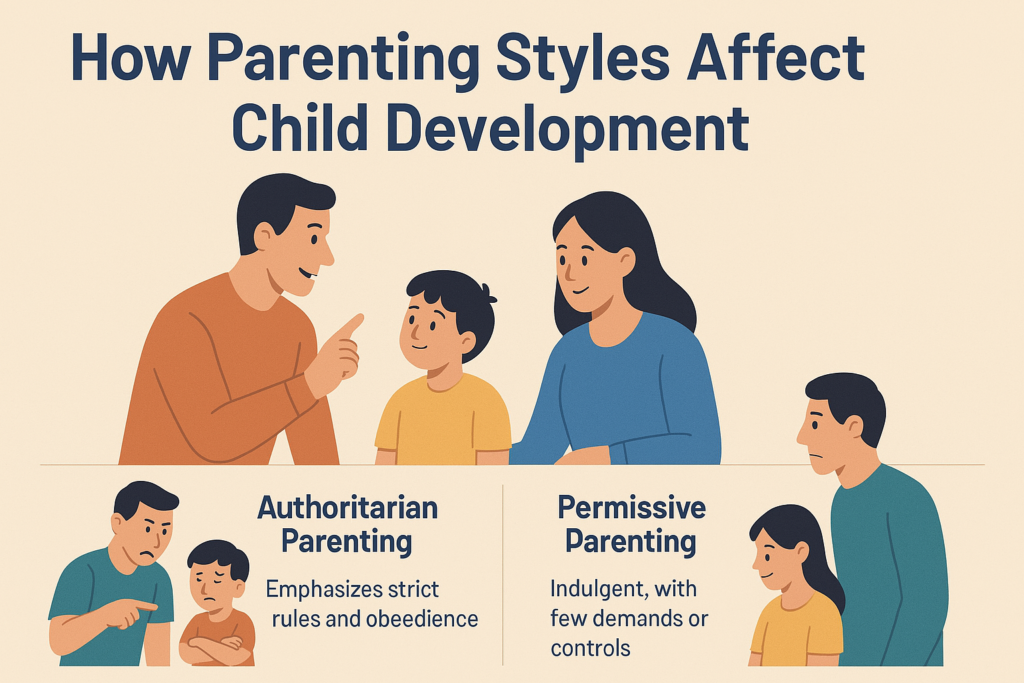Parenting: A Journey of Joy, Challenges, and Profound Responsibility
Parenthood can be both joyful and trying. Nurturing children into confident individuals takes a delicate balance of love, discipline, patience, self-awareness, self-reflection, and introspection on our upbringings that informs how we raise our children. This introspection allows us to create healthier environments for our kids. Let’s learn various aspects of parenting, from styles to fostering strong relationships to navigating modern challenges with greater insight.
Psychologists have identified four parenting styles that significantly impact child development:
Authoritative Parenting:
Authoritative parents balance warmth and structure by setting clear expectations while respecting their children’s opinions and providing firm yet fair discipline, emphasizing open communication. Children raised by authoritative parents usually develop strong self-esteem, social skills, resilience and increased confidence to navigate challenges confidently, knowing they have supportive parents to rely on when needed.
Authoritarian Parenting:
This parenting style emphasizes strict rules and obedience without room for negotiation, prioritizing discipline over emotional responsiveness; consequently, children may excel in structured environments but struggle with self-esteem issues, decision-making abilities and developing healthy relationships.
Permissive Parenting:
Permissive parents tend to be indulgent and permissive, setting few boundaries or consequences. While their children feel secure within this environment, these kids often lack self-discipline and struggle with authority figures – without proper guidance, they could experience academic and social difficulties.
Uninvolved Parenting:
Uninvolved parents provide basic needs like food and shelter but remain emotionally detached, leading to attachment issues, low self-esteem issues and difficulties with academics and social interactions for their child(ren). Children in such environments frequently seek attention or validation from external sources.
Reflections on Our Parenting Legacy
Our upbringing can have an enormous impact on how we parent. For instance, growing up in households where emotions were suppressed might cause us to dismiss our children’s feelings unknowingly; similarly, overly critical or permissive environments during childhood could manifest into rigid or lax approaches later on in life.
Philippa Perry’s famous book “The Book You Wish Your Parents Had Read” emphasizes the value of reflecting upon our past to break negative cycles. Awareness is key: by recognizing patterns and triggers from our childhoods, we gain the power to choose intentional parenting practices which avoid replicating harmful behaviour while cultivating empathy, patience, and understanding instead.
As one example of toxicity characterized by manipulation, neglect, or excessive control, parenting can have lasting repercussions for children. Recognizing signs of narcissistic mothers or emotionally unavailable fathers allows us to address unresolved trauma in these relationships and avoid passing it along to subsequent generations.
Building Strong Parent-Child Relationships To foster healthy relations between you and your child, consider these strategies:
Empathize with Their Feelings:
Acknowledging and validating your child’s emotions – even when they seem unreasonable. According to Perry, when feelings are suppressed, they go into hiding; suppressing emotions can lead to long-term psychological issues; instead, it encourages open dialogue about fears, frustrations and joys.
Set Clear Boundaries With Flexibility:
The structure provides security, while flexibility allows for adaptability. Rules should remain consistent yet adaptable according to age-appropriate needs; for example, simple parenting advocates reducing clutter and overstimulation to help children focus and thrive.
Prioritize Quality Time:
Engage in activities your child finds enjoyable, whether playing games, reading, or exploring nature together. Shared experiences strengthen bonds while creating lasting memories.
Model Desired Behaviors:
Children learn by observation. Modelling kindness, patience and resilience teaches children to embody these traits; mindful parenting techniques such as active listening and presence can further accentuate this modelling effect.
Navigating Modern Parenting Challenges Modern parenting presents unique obstacles. Digital distractions, economic pressures, and changing family dynamics complicate traditional methods. Here is how some common issues may be overcome:
Digital Distractions :
Finding a balance and harmony between screen time and meaningful interactions is key to good health. Create tech-free zones at meal times or bedtime to foster connection, comfort, and restorative sleep.
Economic Pressures:
Financial stress affects single mothers, custodial parents and dual-income families equally. Resources like financial help for single mothers, parenting websites and local support groups provide invaluable assistance. At the same time, programs like GoodInside and Therapeutic Foster Care offer tools for managing stress and building resilience.
Parenting After Separation :
Divorce or separation can create logistical and emotional hurdles. Establishing a formal parenting agreement ensures consistency across households; respectful co-parenting practices help minimize conflict while supporting your children’s emotional well-being.
Long-Distance Parenting :
When parents live apart, maintaining regular contact between themselves becomes imperative to keeping relationships alive despite physical distance. Virtual visits, shared calendars and thoughtful gifts keep relationships strong despite physical separation.
Raising Children With ADHD or Other Special Needs :
Programs such as Taking Charge of ADHD and 123 Magic Parenting provide parents with strategies for dealing with behavioural challenges in neurodivergent children. Patience and consistency are keys when working with neurodivergent kids.
Apology and Repair:
No parent can ever be perfect. There will inevitably be an hour or moments of frustration or miscommunication, yet acknowledging mistakes and apologizing demonstrate humility and accountability. Perry emphasizes how repairing ruptures strengthens trust while modelling healthy conflict-resolution techniques for children. Showing them that making amends is part of human connection fosters emotional intelligence and resilience in them as individuals.
Parenting Can Be Continuous Learning
Each child presents different challenges. New mothers, single mums, and foster mothers can all find helpful resources tailored specifically to their needs – books such as On Becoming Babywise or The Danish Way of Parenting provide evidence-based advice. At the same time, support groups, workshops, or online communities allow you to share experiences and gain knowledge from others.
Calculating financial aid options–such as parenting payments, parental leave entitlements and adoption subsidies–provides families in financial hardship with stability. Tools like “How Much Parenting Payment Calculator” help plan and budget efficiently.
Parenting is a dynamic journey that demands constant reflection, adaptation and growth. By becoming familiar with various parenting styles, cultivating emotional intelligence, and providing nurturing environments, we can guide our children toward becoming empathic, resilient individuals. Reflecting on experiences can break negative cycles while adopting continuous learning helps navigate modern complexities more successfully. In the end, perfection should never be our goal; instead, presence should always remain our main aim – showing love, patience and unwavering support to them in whatever form.
Philippa Perry notes that understanding ourselves is the first step in understanding our children by adopting intentional parenting techniques and drawing upon available resources to build convalescent and stronger families and brighter futures for tomorrow.









